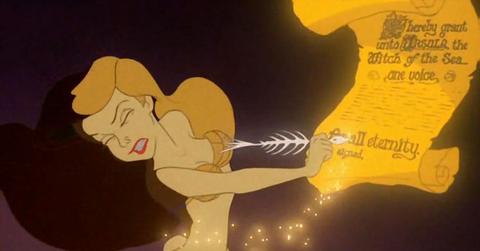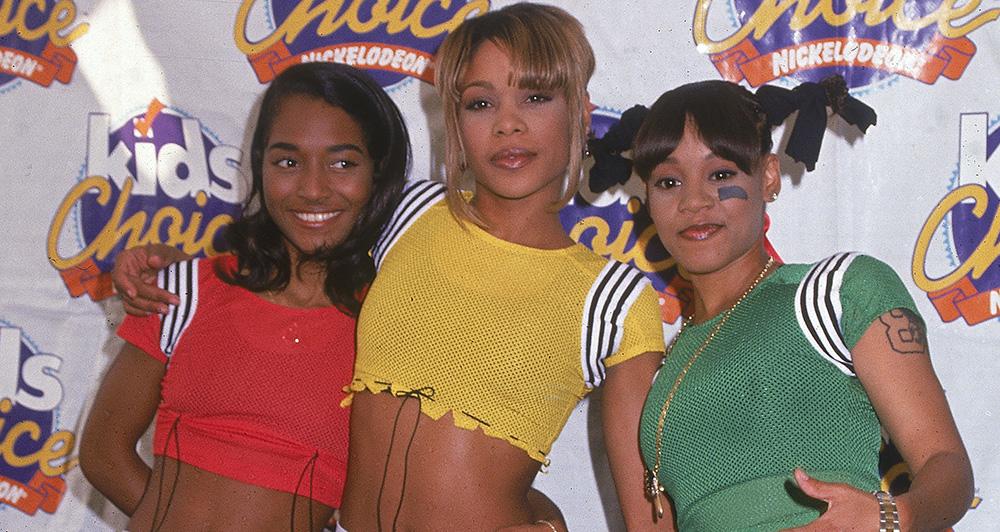The Gritty Reality of What Happens After You Sign a Major Record Deal
<p>Before you chase music stardom, here's what scoring a record deal is really like.</p>
Updated Jan. 8 2019, 2:07 p.m. ET

It's many people's dream to make a living playing music, singing to large stadiums, and collecting Grammys like they're Pokemon cards. Major music labels receive 40,000 demos a year from desperate, starving musicians looking for their big break, and the few who score a record deal are actually incredibly lucky. But their journey doesn't stop once they get the coveted contract.
Although it might seem like scoring a record deal is the one thing all artists need to "make it" in the industry, major labels often take advantage of young, naive talent. Though their contract might say they'll release three albums, many signed artists don't get to release anything at all. Before you chase music stardom, here's what scoring a record deal is really like.
1. Record labels say they'll make you a huge star.

Being scouted by a record label is every struggling musician's dream. A label might fly you out to New York or L.A. and take you out to swanky restaurants where you'll be wined and dined. During this courting, they'll tell you you're going to be a huge star, make tons of money, and be the next "big thing." Since this is literally every artist's dream come true, you'll be so happy and flattered that you'll be ready to sign just about anything they give you — which is the point.
"I'm sure that's a common trick," said rapper Spose, who wrote about his experience being signed with Universal. "It was all just smoke being blown up my a%#."
The reality is that most labels don't follow through on their promises. "My first record deal I probably signed in some fancy restaurant with champagne, I felt like I made it," Victoria Hesketh, a.k.a. British singer Little Boots, told Noisey. "[That] first deal was terrible, and if I’d understood the small print I would not have signed it.”
2. Once signed, there's no guarantee the label will even release your album.

Just because you're signed to a major label doesn't guarantee you'll magically turn into Katy Perry and mirror her success. Depending on your label, there might be several hiccups along the way, and the album you worked so hard on could get "shelved." That's what happened with Sky Ferreira's first album, which was pushed back for years while her label EMI fretted over her sound and prioritized other artists over her. "I turned in five different albums and none of them made sense," she told The Phoenix. "It was just one thing after the other and getting shelved."
It's more common than you think. Of the thousands of acts signed to major labels, only 99 percent of them get to release their first album, and only 0.2 percent of acts manage to avoid getting dropped before they can make that first album. There are several reasons an artist's album gets shelved, but the most common one is that the A&R rep who signed the act got fired, leaving the artist cut off from their only contact at the label and unable to "free" their creative property.
3. If you're lucky enough to get your album released, you might actually *lose* money.

When you sign a record deal, you get a nice, fat advance that can be several thousand dollars. But there's a catch — you actually have to pay that money back through royalties and any other profits you get from albums or touring. According to The Root, for every $1,000 in music sold, the artist only makes $23, or 2.3 percent. Just look at TLC who, despite selling millions of records, had to file for bankruptcy in 1996 after signing a bad contract with LaFace Records. If you're scratching your head wondering how musicians can get a million-dollar advance and still end up broke, Courtney Love brilliantly broke it all down in a column for Salon:
"They spend half a million to record their album. That leaves the band with $500,000. They pay $100,000 to their manager for 20 percent commission. They pay $25,000 each to their lawyer and business manager. That leaves $350,000 for the four band members to split. After $170,000 in taxes, there's $180,000 left. That comes out to $45,000 per person. That's $45,000 to live on for a year until the record gets released."
If you get stuck with a particularly bad contract, you might be stuck paying back for expenses you didn't even need or ask for.
"Any work in the entertainment industry that could be connected to my brand they would take the profit,” Victoria said. "You’re playing $&%* corporate gigs to pay off this massive debt that you’ve got from someone else. They were spending the money your record’s earned on anything from five-star hotels for marketing people to presents. They just spend without my permission on things I would never spend money on."
4. Be prepared to write your music via a "committee."

Once you're signed, the label will hook you up with producers and songwriters to get your single made, which can be a good thing or a bad thing. If you're working with a team of people who understand your artistic vision and your "brand," this could be awesome. However, if you're stuck at a label that simply want to churn out "hits," you might find yourself creating music the same way you create ads — with a committee.
"When I came in for my first [writing] session, the other guys were already clustered around the table, listening to the melody they'd picked out and trying to figure out what sort of song should go with it," Spose wrote. "Finally Mike [Caren] said, 'You gotta make it about a party ... a party you, like, filmed. You filmed all these chicks! And the hook can be...and I got it on caaamera.' They started getting deeper and deeper into brainstorming this song. Then I pointed out that this wasn't at all the kind of music I did."
Labels do this because they want a guaranteed hit, which brings us to the next point...
5. You're not expected to be original.

Even though your originality is what caught the attention of the label, once you're there, you might be forced to record music that's not even you. According to YouTube star Terra Naomi, who said her experience with Universal almost ruined her career, record labels' obsession with "hits" is a reason a lot of them fail:
"The producer I worked with told me we only had one shot, and I needed to make the album he wanted to make – with its 'radio-ready' production – and once I had a few hits, I could make any album I wanted. So I made the album he wanted to make, and things didn’t happen the way he said they would. Instead of the big commercial radio success that would give me the freedom to seamlessly transition into the music I truly wanted to make, I had a big commercial flop (I think we sold something like 25,000 albums), an album I didn’t like, and I’d wasted what could have been the biggest opportunity of my life. The exposure I built independently on YouTube was more than the record label ever did for me, and I couldn’t believe I’d been so willing to hand it over for a longshot gamble on mainstream stardom."
6. You might be forced into a 360 deal.

These days, since streaming is replacing old-school music labels, many record contracts include a "360 deal," which means the label can take a cut from anything an artist makes, be it touring or even a makeup campaign. Rapper Lupe Fiasco said his shady contract with Atlantic Records had such a clause. "I was also told that because you didn't sign this 360 deal, we may or may not push your record," he said in 2010. "So when 'Shining Down' came out, and you didn't hear it on the radio station, that's because they never took it to a radio station."
7. Your label spends the majority of their time and money on bigger artists.

If you're stuck on the same label as a mega pop star like Justin Bieber or Taylor Swift, don't be surprised when the label devotes the majority of their time, energy, and money to their bigger, more sellable acts. And if your label is also working with acts who are similar to you, they might push you aside and promote the other artist instead. "They told me the nastiest things, like, 'Sorry, there's already one girl coming out at the moment, we can't do two,'" Sky told The Phoenix about her struggle with her label.
Sometimes a label might sign an artist and intentionally shelve their album on purpose to keep that artist from competing with another act they believe in more. Evil, huh?
8. And if you're unhappy with the label, too bad. You're stuck there.

Remember JoJo? She was only 13 when she had the smash hit "Leave (Get Out)." She was positioned to be the next Britney Spears, but her label kept her albums hostage for nearly seven years.
"My record company has been going through a major transition and unfortunately all of the artists on the label have been forced to sit on the sidelines and wait," she wrote on Myspace back in 2009. "I exhausted every option and exercised much patience before reaching my final decision to file a formal complaint with the court."She, fortunately, managed to free herself from her ironclad contract in 2014.
So remember, before you sign on the dotted line, read the fine print.